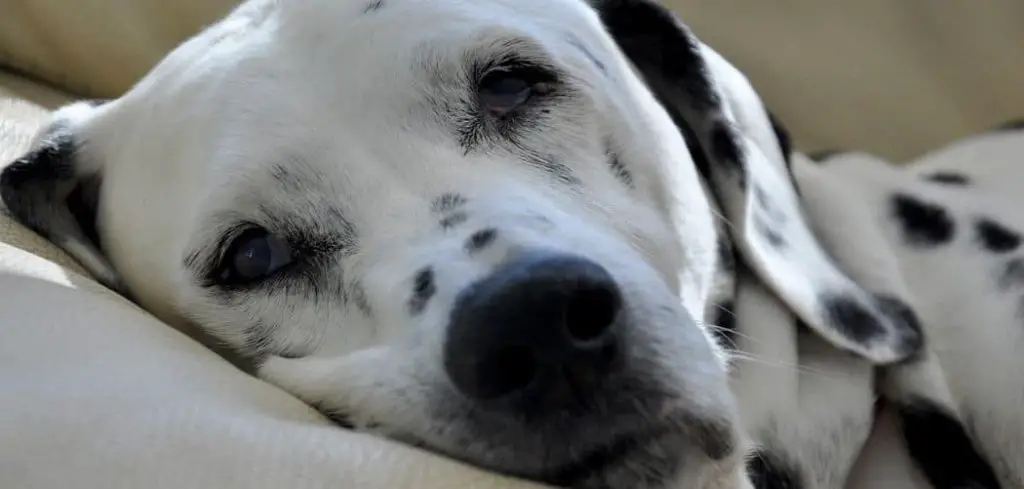When your old dog suddenly becomes lethargic and refuses to eat, it’s natural to feel worried. These symptoms in senior dogs are often a sign that something deeper is affecting their health and should not be ignored.
We outline the common causes of old dog lethargic and not eating, what you can do at home, and when to seek veterinary help.
Old Dog Lethargic and Not Eating — Why It Happens
A lethargic senior dog that won’t eat is often dealing with age-related illnesses such as organ disease, infections, pain, or chronic conditions like arthritis or cancer. These issues can sap a dog’s energy, cause discomfort, and reduce their appetite.
The body slows down, digestion may be impaired, and internal imbalances can make even food seem unappealing. Lethargy and appetite loss often appear together as symptoms of a more significant health concern.

Common Causes of Old Dog Lethargic and Not Eating
Kidney Disease
Kidney disease is common in aging dogs.
As the kidneys begin to fail, toxins that would normally be filtered out start building up in the bloodstream.
This can cause nausea, fatigue, and a significant loss of appetite. Your dog might seem disinterested in food, drink excessively, or vomit. Their energy levels drop dramatically, and you may notice weight loss or bad breath as well.
Left untreated, kidney issues can progress quickly, making early detection and management essential.
Liver Problems
The liver plays a key role in digestion and detoxification.
In older dogs, liver dysfunction can lead to weakness, vomiting, yellowing of the eyes or gums (jaundice), and appetite suppression.
The buildup of toxins in the body leads to lethargy and confusion. Because the liver supports many essential bodily functions, even mild liver issues can cause major changes in your dog’s mood and energy.
Related: Old dog shaking and not eating (Here’s why)
Pain from Arthritis or Injury
Pain can drain a dog’s energy and cause them to skip meals.
Arthritis is especially common in older dogs, making movement painful and discouraging activity. If your dog is too sore to get up or walk, they might also avoid going to their food bowl.
Injuries or undiagnosed joint problems can have the same effect. Look for signs like stiffness when standing, limping, or licking certain joints.
If their discomfort is severe, lethargy and reduced food intake may be their way of coping.
Infections
Senior dogs have weaker immune systems, which makes them more vulnerable to infections.
A simple urinary tract infection or a more serious internal infection can both cause fever, loss of appetite, and lethargy.
Infections often come with other signs: vomiting, diarrhea, bad breath, or changes in urination or thirst. If left untreated, infections can become systemic and life-threatening.
Cancer
Unfortunately, cancer becomes more common as dogs age.
Tumors or cancer-related fatigue may lead to a dog sleeping more, avoiding food, or becoming withdrawn.
Depending on the type, there may also be visible lumps, weight loss, bleeding, or respiratory changes. Even if there are no obvious external signs, internal cancers can deeply affect a dog’s appetite and activity levels.
Early diagnosis can sometimes make a difference in comfort and treatment outcomes.
Gastrointestinal Issues
Digestive issues can make dogs feel sluggish and uninterested in food.
Chronic gastritis, ulcers, or slow motility in the gut can all affect how food is processed. Your dog may experience bloating, nausea, or discomfort after eating, leading them to skip meals altogether.
Lethargy often follows because the body isn’t getting the nutrition it needs. These issues can be especially severe in older dogs with slowed metabolism or prior digestive problems.
What to Do If Your Dog Is Lethargic and Not Eating
Start by checking their environment. Make sure your dog has a quiet, comfortable place to rest.
Eliminate sources of stress or loud noises that could be contributing to their withdrawal.
Encourage hydration by offering cool, clean water or low-sodium broth. Dehydration often worsens lethargy, so even small sips help.
Try tempting them with bland, easy-to-digest foods like boiled chicken, plain rice, or canned senior dog food. Heating the food slightly can enhance the aroma and spark interest.
Limit exercise until you understand what’s wrong. Gentle walks are fine if your dog is up to it, but avoid pushing them to move.
Keep a record of when they last ate, drank, and went to the bathroom. This helps you notice any changes and gives your vet valuable insight.
When to Call or Visit Your Vet
You should contact your vet if:
Your dog refuses food for more than 24 hours.
They appear listless, struggle to stand, or sleep all day without interest in interaction.
There are other symptoms like vomiting, diarrhea, pale gums, breathing changes, or abdominal swelling.
You notice signs of pain, such as shaking, whining, or sensitivity when touched.
If your dog has a chronic condition like kidney disease or arthritis, any sudden change in appetite or energy deserves prompt attention.
Related Blogs
Read more: Old Dog Breathing Heavy and Not Eating (Here’s why)
Read more: Dog Tired and Not Eating (What could it mean?)
Key Takeaway
When your old dog is lethargic and not eating, it could be due to pain, infection, organ disease, or other serious health concerns.
These symptoms should never be dismissed as “just old age.”
While some causes are manageable, others may require immediate care. Monitor your dog closely, offer support at home, and reach out to your vet when needed.
Early intervention is key to helping your senior dog feel better and stay comfortable in their golden years.
